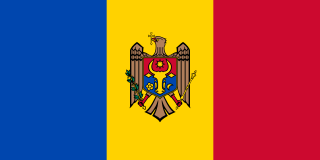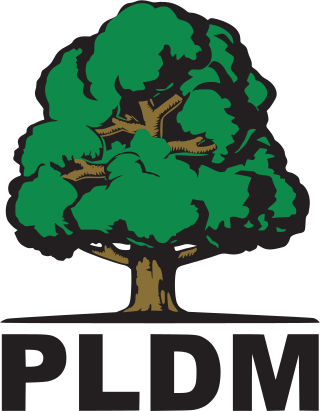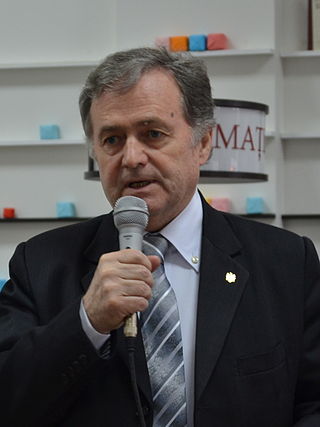
The politics of Moldova take place in a framework of a parliamentary representative democratic republic, wherein the prime minister is the head of the Government of Moldova, and a multi-party system. The President of Moldova has no important powers. The government exercises executive power while the legislative power is vested in the Parliament. The judiciary is independent of the executive and the legislature. The position of the breakaway region of Transnistria, relations with Romania and with Russia, and integration into the EU dominate political discussions.

Moldova, officially the Republic of Moldova, is a landlocked country in Eastern Europe, on the northeastern corner of the Balkans. The country spans a total of 33,483 km2 (12,928 sq mi) and has a population of approximately 2.5 million as of January 2023. Moldova is bordered by Romania to the west and Ukraine to the north, east, and south. The unrecognised breakaway state of Transnistria lies across the Dniester river on the country's eastern border with Ukraine. Moldova is a unitary parliamentary representative democratic republic with its capital in Chișinău, the country's largest city and main cultural and commercial centre.
Moldovan or Moldavian is one of the two local names for the Romanian language in Moldova. Moldovan was declared the official language of Moldova in Article 13 of the constitution adopted in 1994, while the 1991 Declaration of Independence of Moldova used the name Romanian. In 2003, the Moldovan parliament adopted a law defining Moldovan and Romanian as glottonyms for the same language. In 2013, the Constitutional Court of Moldova interpreted that Article 13 of the constitution is superseded by the Declaration of Independence, thus giving official status to the name Romanian. The breakaway region of Transnistria continues to recognize "Moldovan" as one of its official languages, alongside Russian and Ukrainian. Ukraine also continues to make a distinction between Moldovan and Romanian, with one village declaring its language to be Romanian and another declaring it to be Moldovan, though Ukrainian officials have announced an intention to remove the legal status of Moldovan. On 16 March 2023, the Moldovan Parliament approved a law on referring to the national language as Romanian in all legislative texts and the constitution. On 22 March, the president of Moldova, Maia Sandu, promulgated the law.

Transnistria, or Pridnestrovie, officially known as the Pridnestrovian Moldavian Republic (PMR), is a breakaway state internationally recognized as part of Moldova. Transnistria controls most of the narrow strip of land between the Dniester river and the Moldova–Ukraine border, as well as some land on the other side of the river's bank. Its capital and largest city is Tiraspol. Transnistria is officially designated by the Republic of Moldova as the Administrative-Territorial Units of the Left Bank of the Dniester or as Stînga Nistrului.

Gagauzia or Gagauz-Yeri, officially the Autonomous Territorial Unit of Gagauzia (ATUG), is an autonomous territorial unit of Moldova. Its autonomy is intended for the local Gagauz people, a Turkic-speaking, primarily Orthodox ethnic group.

The Party of Communists of the Republic of Moldova is a communist party in Moldova led by Vladimir Voronin. It is the only communist party to have held a majority government in the post-Soviet states. It has been variously described as communist, Moldovenist, populist, Russophile, and pro-Soviet.

The president of the Republic of Moldova is the head of state of Moldova. The current president is Maia Sandu, who assumed office on 24 December 2020.

Moldova elects a legislature at national level. The Parliament (Parlamentul) has 101 members, elected for a four-year term by proportional representation with a 6% electoral threshold. The President used to be elected for a four-year term by a constitutional majority of 60% members of the Parliament, but a Constitutional Court's ruling on 4 March 2016, reverted the election method of the President to a two-round system direct election.

The European Social Democratic Party is a centre-left, populist social-democratic political party in Moldova. Established in 1997, the party holds pro-European views, and is an associate member of the Party of European Socialists (PES) and a full member of the Socialist International. According to its statute, the PSDE pleads that Moldova is an independent, sovereign, and democratic state, based on law, and integrated in the united family of European democracies. Reflecting former leader Marian Lupu's views, but also the strong influence of the Moldovan Orthodox Church, the party is more conservative on social issues, such as LGBT rights.

The Parliament of Moldova is the supreme representative body of the Republic of Moldova, the only state legislative authority, being a unicameral structure composed of 101 elected MPs on lists, for a period or legislature of four years. The Parliament of Moldova is elected by universal vote, equal directly, secret and freely expressed. The president of the Parliament of the Republic of Moldova is elected by the Parliament, with a minimum of 52 votes.

Mihai Ghimpu is a Moldovan politician who served as President of the Moldovan Parliament and Acting President of Moldova from 2009 to 2010. He was member of Parliament of Moldova from 1990 to 1998 and from 2009 to 2019. Ghimpu held the position of leader of Liberal Party (PL) from 1998 to 2018.

Parliamentary elections were held in Moldova on 5 April 2009. The Party of Communists of the Republic of Moldova (PCRM) won a majority of seats for the third consecutive occasion. Turnout was 59%, exceeding the 50% necessary for the election to be valid.

The Liberal Democratic Party of Moldova is a conservative political party in Moldova. The party is led by Tudor Deliu. Until 2016, PLDM was led by Vlad Filat, who was Prime Minister of Moldova from 2009 to 2013, in two cabinets. Immediately after the 2014 parliamentary elections, with 21 seats in the Moldovan Parliament, PLDM was the largest of the three democratic pro-European parliamentary parties.

The Party of Socialists of the Republic of Moldova is a democratic socialist political party in Moldova. A populist party, it holds Eurosceptic and Russophilic views, both of which are reflected by its long-time former leader Igor Dodon. It is contrasted to like-minded centre-left European parties for its conservative views on social issues, reflecting the country's strong social conservatism and the influence of the Moldovan Orthodox Church.
The Alliance for European Integration was a centre-right anti-communist ruling coalition in Moldova from the July 2009 election until it lost to a no confidence vote in the Parliament on February 13, 2013. It was succeeded by the anti-communist Pro-European Coalition.

The independence of Moldova was officially recognized on 2 March 1992, when Moldova gained membership of the United Nations. The nation had declared its independence from the Soviet Union on 27 August 1991, and was a co-founder of the post-Soviet Commonwealth of Independent States. Moldova became fully independent from the Soviet Union that December, and joined the United Nations three months later.

Ion Hadârcă is a poet, translator and Moldovan politician, deputy to the Parliament of the Republic of Moldova between 1990 and 1998 and from 2009 to 2014. Ion Hadârcă was the founder and first president of the Popular Front of Moldova (1989–1992), chairman of the Liberal Reformist Party.

Valeriu Streleț is a Moldovan politician who was Prime Minister of Moldova in 2015. He subsequently received a vote of no-confidence on 29 October 2015.

The Party of Action and Solidarity is a liberal political party in Moldova. The PAS was founded by Maia Sandu, the former Minister of Education and the incumbent president of Moldova. A pro-European party, it is an observer of the European People's Party (EPP) and the International Democrat Union (IDU).

The accession of Moldova to the European Union (EU) is on the current agenda for future enlargement of the EU.

















